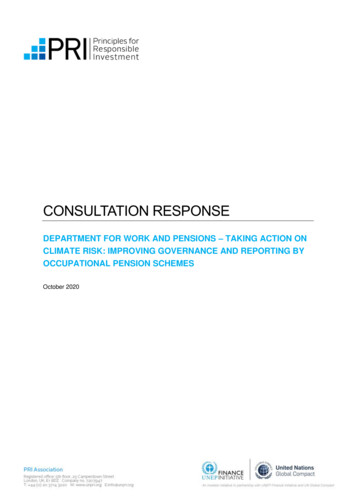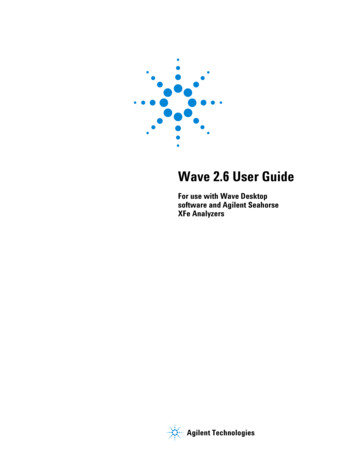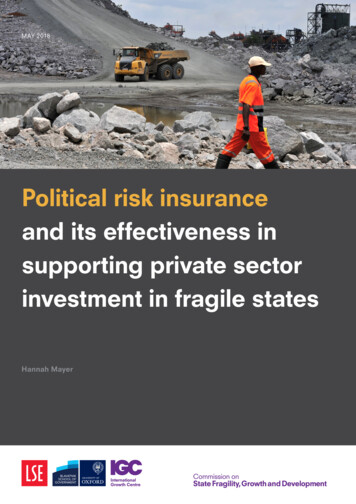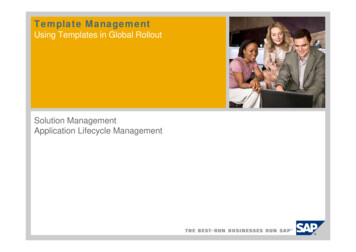
Transcription
CONSULTATION RESPONSEDEPARTMENT FOR WORK AND PENSIONS – TAKING ACTION ONCLIMATE RISK: IMPROVING GOVERNANCE AND REPORTING BYOCCUPATIONAL PENSION SCHEMESOctober 2020
ABOUT THE PRIThe Principles for Responsible Investment (PRI) is the world’s leading initiative on responsibleinvestment. The PRI is now a not-for-profit company with over 3,000 signatories (pension funds,insurers, investment managers and service providers) to the PRI’s six principles with approximatelyUS 101 trillion in assets under management. 474 of these signatories, representing 9 trillion, arebased in the United Kingdom.The PRI supports its international network of signatories in implementing the Principles. As long-terminvestors acting in the best interests of their beneficiaries and clients, our signatories work tounderstand the contribution that environmental, social and governance (ESG) factors make toinvestment performance, the role that investment plays in broader financial markets and the impactthat those investments have on the environment and society as a whole.The PRI works to achieve this sustainable global financial system by encouraging adoption of thePrinciples and collaboration on their implementation; by fostering good governance, integrity andaccountability; and by addressing obstacles to a sustainable financial system that lie within marketpractices, structures and regulation.For more information, contactEdward BakerSenior Specialist, Climate and Energy TransitionEdward.Baker@unpri.orgEmmet McNameeSenior Policy AnalystEmmet.McNamee@unpri.org2
SUMMARY OF THE PRI’S POSITIONThe PRI welcomes the leadership shown by the Department for Work and Pensions in bringingforward these proposals. Asset owners have a pivotal role to play in driving change throughout theinvestment chain. Making climate disclosure mandatory for UK pension funds will accelerate investorawareness and action on climate change in the UK, as well as setting an example for other countriesto follow in the build-up to COP 26 next year.The UK is one of the more advanced markets globally for asset owner climate reporting. This isconsistently borne out in the investor reporting to the PRI, which uses a set of indicator questions thatare based on the TCFD recommendations. In the first quarter of this year, 330 UK investors including55 asset owners reported to PRI against these indicators. The PRI believes this can be considered ameasure of the capacity for investor climate reporting that presently exists in the UK.The PRI recommends:1. Revising the recommendation on scenario analysis to include orderly and disorderlyscenarios. It is not just the temperature outcome, but the path to it which is highly relevant forinvestors. While a reference to disorderly scenarios is included in the consultation guidance,the PRI recommends including it in the main recommendation.2. Including net zero alignment metrics in future metrics reviews. It is important forschemes to understand not only their exposure to climate risk but their alignment with andcontribution to sustainable outcomes. One of the leading examples of this is the percentagealignment with the EU taxonomy.3. Requiring the reporting of GHG exposure metrics and targets on an annual, rather thanquarterly, basis. Quarterly reporting could have the unintended consequences ofencouraging perverse short-termism, while increasing the cost of compliance.4. Removing the direct reference to Weighted Average Carbon Intensity (WACI). ThePartnership for Carbon Accounting Financials (PCAF) offers some methodologicaladvantages over WACI in the calculation of Scope 3 emissions. In updating its technicalguidance and recommendations, the TCFD Taskforce is also proposing to replace WACI withPCAF.5. Including the possibility of requiring scheme consolidation within a future review ofthe regulations’ scope. Over the long-term, all pension savers should be covered by arobust approach to climate governance, risk management and reporting.3
DETAILED RESPONSEQ1. Do you agree with our policy proposals? [scope]Yes, the PRI supports the proposed schemes to be included within the scope of the requirements.However, as set out in response to Q3, the long-term regulatory regime for pension schemes mustensure that all savers belong to schemes that take a robust approach to climate governance andreporting.Q2. Do you agree with these policy proposals? [timing]Yes, the PRI agrees with the proposed implementation timeline. Data from investor reporting to thePRI over the past three years has consistently shown that the UK is an advanced market for assetowner TCFD reporting. In Q1 of this year 2,097 investors reported to PRI on TCFD-based indicatorquestions. This included 330 UK-based investors and 55 UK asset owners. In absolute terms therewere more asset owners reporting to PRI from the UK than in any of the other 50 markets that the PRIoperates in. Moreover, investor climate reporting came from across our UK signatory base. The graphbelow shows the breakdown of reporting by size of investor AUM 1 (asset owners are in red).UK investor TCFD based reporting to the PRI in 2020 by assets under managementTotal 50 249.99bn 10 49.99bn 1 9.99bn 1bn0IM public reporting50100150Total no. of IM reporting200AO Public reporting250300Total no. of AO reportingSource: PRI 2020 climate snapshotThese asset owners are estimated to account for approximately 20%2 of all pension funds in the UKby assets under management and includes many of the largest schemes. A full list of PRI’s UKsignatories is available here. Reporting to an industry body, PRI, indicates the readiness of UK1In 2020 investors had the option of reporting privately to the PRI on these TCFD based indicator questions. 17 UK assetowners opted to make their response public and the report can be found online in the searchable database here.2Source PRI report “Private retirement systems and sustainability: United Kingdom”4
pension funds for a mandatory reporting requirement. The PRI will continue to tighten investor climatereporting requirements to require: By the end of March 2021 all eligible PRI investor signatories 3 to report and publicly discloseagainst TCFD based governance and strategy indicators. The responses will contribute to theinvestor’s overall reporting score. Reporting on risk management, metrics and targets will remainvoluntary in 2021 By the end of March 2022, it will be mandatory for all eligible PRI investor signatories to reportand publicly disclose against all TCFD-based climate indicators. The responses will be included inthe investor’s reporting score (this score is private to the investor signatory). This will apply toover 3,000 investors worldwide and over 450 in the UK.Q3. Do you agree with these proposals? [review]Yes, the PRI supports the proposed review. The PRI further recommends that options to encouragesmaller schemes to consolidate be included within the terms of the review. Pension savers should notbe subject to different outcomes based on the size of the scheme to which they belong.While it is reasonable to expect that larger schemes should lead the way in complying with theproposed requirements and supporting capacity building for the sector, the scale of the risk climatechange poses to pension savings and the financial system more broadly means that, over the longterm, no scheme should be exempt from having a robust approach to climate governance, riskmanagement and reporting.Should there continue to be schemes of any size in 2024 that are not in a position to comply with therequirements set out here, the review should consider whether such lack of capacity on the part of thescheme is grounds to require that scheme to consolidate into a compliant scheme.Q6. Do you agree with these proposals? [scenario analysis]The PRI recommends that regulations require trustees to identify and disclose the climate changerisks and opportunities relevant to their scheme in both orderly and disorderly scenarios.Chapter 3 of the consultation document proposes to include guidance on the difference betweenorderly and disorderly transitions but does not explicitly require this analysis to be disclosed. The PRIbelieves that insufficient action has been taken to achieve commitments made under the ParisAgreement and that the realities of climate change will force governments to act more decisively. ThePRI’s Inevitable Policy Response project4, which aims to quantify the impact of this response on thereal economy and financial markets, forecasts that by 2025, governments will respond in a way that isforceful, abrupt, and disorderly. This is also consistent with the guidance from the Network for34New investor signatories get a one year grace period on reporting to the PRI.https://www.unpri.org/inevitable-policx 4787.article5
Greening the Financial System (NGFS). Whilst the consultation guidance does reference the NGFSand disorderly scenarios, this is not directly referenced in scenario proposals.As such PRI would recommend revising the wording from:“Describe the resilience of the scheme’s investment and, in the case of DB, funding strategy,as far as the trustees are able to, in at least two climate scenarios, including at least onescenario of between 1.5 degrees and 2 degrees”.to:“Describe the resilience of the scheme’s investment and, in the case of DB, funding strategy,as far as the trustees are able to a range of climate scenarios, including orderly and disorderlytransitions to a scenario of between 1.5 degrees and 2 degrees”.The rationale being that it is not just the temperature outcome, but the path to it, whether it is orderlyor disorderly, that is highly relevant for pension funds.Q8. Do you agree with these proposals? [metrics]The PRI recommends modifying the requirement to calculate GHG emission-based metrics on aquarterly to an annual basis, including net zero alignment metrics in future metrics reviews, andremoving the explicit reference to WACI.The PRI has concerns about the quarterly calculating of GHG emission-based metrics. This couldcreate perverse incentives, encouraging trustees to take a short-term approach in acting on resultsfrom carbon intensity, temperature warming or other commonly used metrics than would otherwise bethe case. Issues with data and methodological reliability may amplify the risk of unintendedconsequences. It would also be likely to increase the cost of compliance.The PRI recommends including net zero alignment metrics in future metrics reviews. It is important forschemes to understand not only their exposure to climate risk but their alignment with andcontribution to sustainable outcomes. One of the leading examples of this is the percentage alignmentwith the EU taxonomy, which identifies the share of economic activities a fund or scheme is investedin which are consistent with a net zero by 2050 trajectory, and as such would be consistent with theUK’s own net zero commitment.The Partnership for Carbon Accounting Financials (PCAF) offers some methodological advantages inthe calculation of Scope 3 emissions and is supported by a number of large US banks. The TCFDTaskforce will soon publish a consultation proposing replacing WACI with PCAF. Given theimportance of common methodology and limiting overall compliance costs, the PRI recommendsremoving the direct reference to WACI in box 9a:M2.6
Q9. Do you agree with these proposals? [targets]The PRI supports making disclosure against climate-related targets mandatory on an annual basis.This encourages trustees to think forward on climate change and take action to protect the value oftheir investments.In partnership with the UNEP-FI, PRI co-convenes the Net Zero Asset Owner Alliance, which is anindustry investor group that has committed to decarbonising their investment portfolio completely by2050. It includes a number of UK pension funds. The guidance and targets that this group developscould provide a frame of reference for any future revisions to DWP climate disclosure requirements.Q10. Do you agree with these proposals? [disclosure]Yes, the PRI supports the proposals on disclosure. The PRI further recommends that a public registryof TCFD reports is created and managed by The Pensions Regulator. This would enable the industrycapacity building that DWP discusses and would also allow engaged beneficiaries to compare theirscheme’s performance on the areas covered by the regulations with other schemes, and to push forimprovements where necessary.7
by assets under management and includes many of the largest schemes. A full list of PRI's UK signatories is available here. Reporting to an industry body, PRI, indicates the readiness of UK . transitions to a scenario of between 1.5 degrees and 2 degrees". The rationale being that it is not just the temperature outcome, but the path to it .










